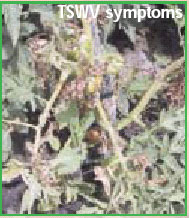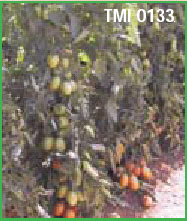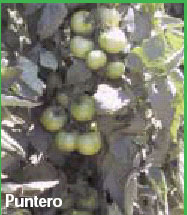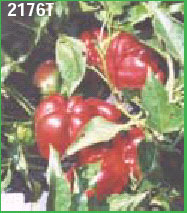|
Tomato Spotted
Wilt progress
-

Grower Solutions Magazine
Lefroy Valley
June
2003
TSWV and its vector the Western
Flower Thrips (WFT), are becoming a greater problem in
more localities in Australia by the season. This season
hundreds of thousands of plants were lost in the Perth
metro costing growers bucket loads of money. In previous
articles I have suggested that there is no simple
solution to this problem. A multi-pronged strategy is
required, which needs to be adopted collectively. This
is a community problem and as such has to be attacked by
the community.
Tony Burfield & Nhieu
Nguyen, of the WFT control program in South Australia
were approached to present the strategy that has been
used with good success in that state over the past few
years. At two presentations they emphasised the
importance of training of growers to understand their
enemy and the necessity of growers to work together in
their areas to attack the problem.
This training involved the
following
basic points:
  The use of a yellow sticky trap is essential to monitor
populations of WFT moving into the crop. This will
provide feedback of the affectivity of spray programmes
& will provide evidence within two to three days of new
populations moving into the crop and long before TSWV
symptoms begin to show.
The use of a yellow sticky trap is essential to monitor
populations of WFT moving into the crop. This will
provide feedback of the affectivity of spray programmes
& will provide evidence within two to three days of new
populations moving into the crop and long before TSWV
symptoms begin to show.
  Infected plants should be up-rooted, placed in a plastic
bag and removed from the paddock as soon as symptoms are
observed. Contact with other plants should be avoided
and infected plants should be buried.
Infected plants should be up-rooted, placed in a plastic
bag and removed from the paddock as soon as symptoms are
observed. Contact with other plants should be avoided
and infected plants should be buried.
|
|
  The removal of any weeds from the vicinity of the crop
that is in the control of the grower. There will be
areas close to the crop that are not in the control of
the grower which is why neighbours should be working
together to ensure a better growing environment for all.
The removal of any weeds from the vicinity of the crop
that is in the control of the grower. There will be
areas close to the crop that are not in the control of
the grower which is why neighbours should be working
together to ensure a better growing environment for all.
  The use of registered chemicals at label rates, with
correct volume of water and at recommended intervals &
with regularly calibrated and serviced spray equipment.
The pH of the spray solution should be between 6.5 and
7.5, which is easily corrected using HYGROBUFF. There is
a high risk of chemical failure in certain products when
the pH is higher than 8.5.
The use of registered chemicals at label rates, with
correct volume of water and at recommended intervals &
with regularly calibrated and serviced spray equipment.
The pH of the spray solution should be between 6.5 and
7.5, which is easily corrected using HYGROBUFF. There is
a high risk of chemical failure in certain products when
the pH is higher than 8.5.
 5 The use of TSWV tolerant varieties. This is not the
answer to all evils! TSWV resistance in capsicums &
tomatoes is single gene resistance, which if placed
under heavy disease pressure, can break down. TSWV
tolerance is a valuable tool that should be used
carefully together with all the other control measures.
In the 2002/3 season in both South Australia & WA
resistance breaking strains of TSWV have appeared when
WFT control measures have been ignored. In the Perth
metro tomato screening trials have yielded the following
varieties that have TSWV tolerance together with
acceptable horticultural characteristics. TMI 2425 has
shown very good early season vigour in Perth, stood up
very well against TSWV attack, and provided good yields
of non-green shouldered fruit. TMI 3161T from Hazera,
stood up well against TSWV in spring in Perth, yielding
firm non-green shouldered fruit. In the Roma class TMI
0133T performed well against TSWV infection. Fruit are
smaller than Colibri, but have no nipple and are larger
than Salita. This variety has shown good early season
vigour in Perth and also performed well as a regular
variety in Carnarvon. In the capsicums CLT 2167T from
Clause, performed well in the mid-season in Perth. The
bush is compact and provides a concentrated set of large
blocky fruit. This variety performed better as the
summer season warmed up after the late spring weather.
Two additional varieties with larger Lamuyo shaped fruit
CPS 2739 and CPS 2738 both from Clause, have been
trialed late in the season and have shown good
potential. The search has not stopped here! Screening
trials with all available material from around the world
has been placed in screening trials in Carnarvon for
screening of horticultural characteristics. The best
will be lifted out for trialing in high TSWV pressure
areas in spring.
5 The use of TSWV tolerant varieties. This is not the
answer to all evils! TSWV resistance in capsicums &
tomatoes is single gene resistance, which if placed
under heavy disease pressure, can break down. TSWV
tolerance is a valuable tool that should be used
carefully together with all the other control measures.
In the 2002/3 season in both South Australia & WA
resistance breaking strains of TSWV have appeared when
WFT control measures have been ignored. In the Perth
metro tomato screening trials have yielded the following
varieties that have TSWV tolerance together with
acceptable horticultural characteristics. TMI 2425 has
shown very good early season vigour in Perth, stood up
very well against TSWV attack, and provided good yields
of non-green shouldered fruit. TMI 3161T from Hazera,
stood up well against TSWV in spring in Perth, yielding
firm non-green shouldered fruit. In the Roma class TMI
0133T performed well against TSWV infection. Fruit are
smaller than Colibri, but have no nipple and are larger
than Salita. This variety has shown good early season
vigour in Perth and also performed well as a regular
variety in Carnarvon. In the capsicums CLT 2167T from
Clause, performed well in the mid-season in Perth. The
bush is compact and provides a concentrated set of large
blocky fruit. This variety performed better as the
summer season warmed up after the late spring weather.
Two additional varieties with larger Lamuyo shaped fruit
CPS 2739 and CPS 2738 both from Clause, have been
trialed late in the season and have shown good
potential. The search has not stopped here! Screening
trials with all available material from around the world
has been placed in screening trials in Carnarvon for
screening of horticultural characteristics. The best
will be lifted out for trialing in high TSWV pressure
areas in spring.
By Peter Mullins
|